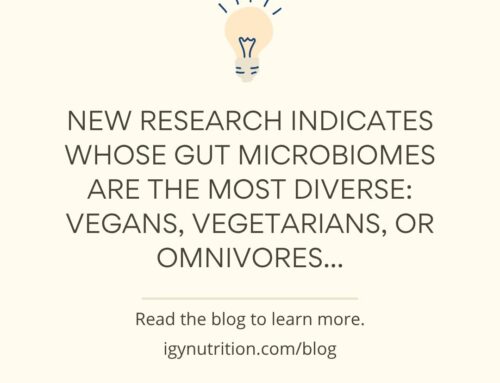Best Studies on Gut Health in 2021
Scientists are always learning more about gut health. If you’re a nerd like us, you might be asking – what did scientists discover about gut health in 2021?
Today, we’ll be talking about some of the most significant discoveries scientists made about nutrition and gut health in 2021.
Scientists Recommend Including an RDA for Live Microbes
A study by scientists at Stanford University showed that high fermented food intake influences immune system status and gut microbiome function for the better (1).
More specifically, six servings per day of fermented food (1):
- Increased gut microbiome diversity
- Changed microbiome composition
- Decreased inflammatory markers in the gut
This study’s results led scientists to recommend that the nationwide RDA include live microbe intake. Back up – what’s the RDA?
RDA stands for Recommended Dietary Allowance. In the United States, there are RDAs for macronutrients, vitamins, and minerals.
RDAs are the recommended amounts of certain nutrients to consume daily. For example, the RDA for zinc is 8g per day for women and 11g for men (2).
Currently, there is no RDA for fermented foods. The scientists that authored this study insist that fermented food intake is key to a healthy diet and are asking the government to confirm this by creating an RDA for fermented food.
New Probiotic Findings
Our good old friend probiotics came to the rescue yet again in 2021. Scientists have identified some key benefits of certain probiotics – and they’re pretty exciting if you ask us!
First off, we have two new star probiotics: Bacillus coagulans MY01 and Bacillus subtilis MY02 (3).
Eight-week consumption of these probiotics along with a prebiotic was found to (3):
- Reduce dyspepsia symptoms
- Increase Faecalibacterium in stools (a beneficial microbe)
- Reduce SIBO (small intestinal bacterial overgrowth)
- Reduced Th17 signaling, a pathway that is linked to autoimmune disease
Reducing SIBO and Th17 signaling? Sign me up!
Probiotics for Obesity
This year, we learned about a few more probiotics for obesity, including Dysosmobacter welbionis and Bifidobacterium longum APC1472.
Bifidobacterium longum APC1472’s ability is pretty interesting in our book – it reduces hunger by weakening ghrelin receptor signaling (4). Ghrelin is a hormone that stimulates appetite.
Bifidobacterium longum APC1472 was also found to reduce fasting blood glucose, asserting that it may help to regulate insulin sensitivity (4).
Dysosmobacter welbionis is inversely associated with body mass index, fasting glucose, and glycated hemoglobin (a marker of blood sugar regulation over time).
This finding indicates that higher levels of Dysosmobacter welbionis are correlated with lower BMI, fasting glucose, and glycated hemoglobin (5).
A 2021 study found that feeding mice D. welbionis J115 reduced body weight and fat mass (5).
These two probiotics look like strong candidates for weight management. Hopefully, they’ll be on shelves soon!
Thanks for joining us today to learn about the newest scientific discoveries on gut health. We’ll be back in 2022 with more!
References
- Wastyk HC, Fragiadakis GK, Perelman D, Dahan D, Merrill BD, Yu FB, Topf M, Gonzalez CG, Van Treuren W, Han S, Robinson JL, Elias JE, Sonnenburg ED, Gardner CD, Sonnenburg JL. Gut-microbiota-targeted diets modulate human immune status. Cell. 2021 Aug 5;184(16):4137-4153.e14. doi: 10.1016/j.cell.2021.06.019. Epub 2021 Jul 12. PMID: 34256014. https://pubmed.ncbi.nlm.nih.gov/34256014/
- https://www.hsph.harvard.edu/nutritionsource/zinc/#:~:text=RDA%3A%20The%20Recommended%20Dietary%20Allowance,cause%20harmful%20effects%20on%20health.
- Wauters L, Slaets H, De Paepe K, Ceulemans M, Wetzels S, Geboers K, Toth J, Thys W, Dybajlo R, Walgraeve D, Biessen E, Verbeke K, Tack J, Van de Wiele T, Hellings N, Vanuytsel T. Efficacy and safety of spore-forming probiotics in the treatment of functional dyspepsia: a pilot randomised, double-blind, placebo-controlled trial. Lancet Gastroenterol Hepatol. 2021 Oct;6(10):784-792. doi: 10.1016/S2468-1253(21)00226-0. Epub 2021 Aug 3. Erratum in: Lancet Gastroenterol Hepatol. 2021 Aug 27;: PMID: 34358486. https://pubmed.ncbi.nlm.nih.gov/34358486/
- Fuentes et al. Bifidobacterium longum counters the effects of obesity: Partial successful translation from rodent to human. Lancet. 2021 Jan;1. https://www.thelancet.com/journals/ebiom/article/PIIS2352-3964(20)30552-1/fulltext
- Le Roy T, Moens de Hase E, Van Hul M, et al. Dysosmobacter welbionis is a newly isolated human commensal bacterium preventing diet-induced obesity and metabolic disorders in mice. Gut 2022;71:534-543. https://gut.bmj.com/content/71/3/534.citation-tools




